
A Maxwell Trial Recap pt. 2
Collected notes from inside the Ghislaine Maxwell Trial
After my first week in New York I decide that if I’m going to commit to riding this trial out till the end it means making peace with flying back and forth from California to New York th roughout the whole month of December. To juggle birthday parties (Arlo’s 16th) holiday events, gift shopping, school activities … all the stresses that come attached to the holiday season.
The timing of it all, couldn’t be more inconvenient.
Travel expenses I can manage thanks to generous donations from the public. The financial support makes me want to give back everything I can as far as coverage is concerned. I make a conscious effort to disconnect myself from a fully formed narrative based on everything I knew, or thought I knew about the case, and all parties involved. So that I walk into that courtroom everyday channeling a juror’s mindset.
Admittedly though, some core suspicions are hard to shake. Part of me is there hoping to dismantle my own theories about this trial being one big façade to carve out the narrowest version of a much darker, far more involved tale, to appease our desire for justice by persecuting one woman for the crimes of a hundred nameless men.
In coming to New York, to experience it first hand, I’m open to battling these intuitions.
After the first week our days at the courthouse start to bleed together. Daily we clock in around 13 hours from arrival to departure. It’s a dizzying routine. During the week we don’t see much daylight. Or go out to dinner, or socialize outside of that courtroom. In the brief breaks we are allotted throughout the day we have to prioritize: food, bathroom, phone retrieval, online updates, coffee refuel.
Sometimes I rush out to call and check in on my kids, who are scattered between friends and family helping me out while I’m away. Other days I skip lunch altogether and remain in the courtroom editing notes or reading while everyone else files out. This, I learn early on, is where the most unguarded interactions occur. Lunch time, specifically, when the room is empty save for a couple Marshalls and attorneys who tend to stick around because of better wifi.
Occasionally things take shape before everyone has had a chance to return from their break. In these instances, I watch the Maxwell family members engaged and animated in conversations. The twins dialogue shifts between French and English, the two of them discussing court notes and sharing photos on their phones. I catch Isabel, more than once, helping Christine pull a coat over her shoulders before they head out.
By most regards, this is a family we’re supposed to hate. Support for their youngest sister is portrayed as reckless denial. Their allegiance paints them as heartless allies to a sexual predator. Entitled, tone deaf, pathetic.
Their devotion though intrigues me. Everything about the Maxwell family intrigues me. An unexpected footnote I find myself dwelling on, knowing what little I do about the ‘lavish nightmare’ their childhood has been described as, and the shame they endured after the crimes of their father were exposed. I wonder how much of these experiences - pitting them against the world - ultimately secured the unbreakable bond we see today. Family dynamics, no matter the tale at hand, are always most compelling to me.
In this dedication, to vindicating a woman the rest of the world is desperate to see legally crucified, I wonder the guts it takes to stand up for her publicly, on national television. In light of such horrific accusations. Slammed by the public for suggesting she is a scapegoat to Epstein’s crimes. Ridiculed outside the courthouse every day surrounded by hecklers, calling her a “monster" a “child molester,” a “pimp” and worse.
This kind of public battery of course is nothing new for the Maxwell family. In the year following their father’s death, when news of his shocking pension fund fraud first erupted in the UK, Isabel told a reporter “Cameras followed us everywhere. I used to carry a tennis racquet and wave it around to fend off the photographers.” Explaining, “I have learned not to run away from bad times. Personal tragedies and loss connect you to what is happening in this world...I am a survivor with an innate fire that doesn't allow me to be destroyed.”
In describing the close bond she shares with her siblings, she says she grew up “completely in sync with the family” recalling that “when something got to her siblings, it got to her too.”
The extent of this devotion is echoed in the personal documents the family submitted after Ghislaine’s arrest in 2020, letters (testaments of her character written by friends and family) presented to the judge in a request for bail while she was awaiting trial. A failed attempt, signed by all six siblings.
Their presence in the courtroom is consistent. Isabel and Kevin arrive daily, Christine and Ian, less frequently. On the day Ian first shows up, Ghislaine is ecstatic to see him. Smiling at him as he is crouched behind her, the two of them laughing, joking, gesturing to the others on the bench beside him.
On that same afternoon, Marlin (a young independent reporter I’ve taken a liking to) and I walk into an elevator on break, where we find all four Maxwells crammed in the back. Marlin apologizes immediately “I’m sorry,” he says (twice) “I didn’t know. I would have waited” he explains. As if these elevators pledged an unspoken vow to shield a family that have lived their entire lives under public scrutiny.
“It’s fine,” Kevin Maxwell, says, dismissing his concern “There is no such thing as anonymity in a New York elevator.”
Isabel, her arm locked around his in a red beret, smiles slightly.
Later in the week I stumble upon a video of Ian Maxwell in an interview on a British news channel online, defending his sister’s innocence. His eyes flicker the same way his fathers do in the videos I’ve seen, eyebrows working earnestly to match his emotions. He is handsome, expressive, well spoken. Like all of the Maxwells.
In this interview he is arguing that Ghislaine’s image has been deconstructed as a two dimensional “monster” by the media. Telling the reporter she’s a “patsy” for this whole operation, to make up for the fact that the government lost Epstein on their own watch. And are now using her to make up for it.
The comments attached are scathing.
Later in the week I’m reminded of a quote by Joan Didion, something about how covering trials tends to unearth deeper reflections of ourselves. A reference I can’t track down when I try to revisit it, but recall the basics of her sentiments, how covering a trial forces you to see aspects of yourself and your own life experiences in conjunction with the ones displayed before you.
This, I figure is another reason I’m so infatuated by the family bond. At the base of it, I suppose I’m envious. In comparing my own family dynamics, as they stand today, I think about how we’ve always let grudges and petty differences get in the way of things. More, now so than ever. Like so many families these past two years, during such strange times, differing politics and varying views of the pandemic worked to divide us.
Proof of tepid loyalty.
I dare imagine myself in similar circumstance, under a microscope of media shaming, wondering who (if any) would stand by me the same way…
As far as introspection goes, being inside a courtroom is people watching at it’s finest. Like arranging pieces of a phycological puzzle, where it pays to be nosey. Where a certain aspect of snooping is not only accepted but expected.
One day, on the way to the woman’s bathroom for instance, I notice that the defense team holds their meetings in the office next door. From then on out, during brief pauses, when I’m brave enough to linger momentarily outside that bathroom door, I can hear them mulling over the day’s details. On one occasion I hear Christian Everdale fuming about a headline in the paper that appears to be incriminating Ghislaine Maxwell. He’s not happy about it.
Other times I hear them back there laughing, joking like teachers on break in the lounge room. Even after a major setback in the courtroom.
This, it turns out, is why the bathroom run-ins with attorneys and family members on the 5th floor are so frequent. And where Laura, an ambitious investigative reporter from France, goes to pick up whatever pieces she can in elevators and hallways two floors above, where the Maxwell twins converse in French, unaware (or perhaps unbothered) by her secret understanding of them.
She tells us one afternoon that she overheard Ghislaine say to Isabel during court “il est gentil mais il n'est pas très intelligent”
"He’s nice, but he’s not very smart.”
This keeps us guessing all day over who it is she might have been referring to.
Everyone in there is analyzing Maxwell’s every move. Whenever she is escorted back into the room before court resumes, the potential for eye contact is unnerving.
There are two ways she looks at you. One, in casual passing, a quick glance to scan the room where she might catch your eye as a reflex, to gage the crowd behind her. The other, is a direct, dramatic eye lock that happens when she zeros in on any individual, holding steady gaze until either of you looks away.
The connection is a jolt of eerie, albeit oddly inviting, energy. A fact that generally freaks everyone out. I know, because we all talk about it. How a woman without words can command the attention of room who is mainly there to judge everything about her.
During each of these silent stand offs I make a solid effort to stay locked, but always end up looking away first.
If this is some kind of power move we’re playing, Ghislaine wins every time.
Jane Rosenberg, part of the trio of court sketch artists, shared details of her interactions with Maxwell in a Rolling Stone interview, recalling how, when she realized Ghislaine was sketching her (a scene now secured in a viral image on twitter) “it was kind of cute to me. It didn’t bother me at all. I was just like, oh, she’s sketching me. I wasn’t gonna be thrown off my game.” She doesn’t view it necessarily as a power move on Maxwell’s part — “I don’t know what’s in her mind” — she says, but does note in her interview how Maxwell is “extraordinarily demonstrative” with her legal team compared to other defendants she’s sketched. She says Maxwell being permitted by the judge to briefly speak with her siblings during the proceedings, is something she hasn’t witnessed before.
“She does a lot of hugging and kissing of her lawyers in the courtroom. That’s quite unusual….I guess she needs affection. She’s isolated in her jail cell all the time. I don’t know,” she says. Rosenberg adds, Maxwell is also “quite animated compared to a lot of defendants.” “A lot sit like a lump in their chair and don’t do anything. So that’s helpful for me.”
Maxwell, she says attempted to initiate contact with her, at one point turning around and pulling down her mask to say, “Long day, isn’t it?” Rosenberg responded that yes, it was. “Since then we’ve developed some kind of rapport which I do not want to lose,” as it helps her render her drawings. “She’ll nod to me now. I’ll get eyebrow lifts and nods. It’s great for me. I need to keep that going. She sits around posing for me. It’s great.”
One morning, we walk in to find Ghislaine standing there in front of us, talking to Leah Saffian, unmasked - which - these days is akin to stumbling in on someone half dressed. How weirdly intrusive it feels.
Her bare face staring back at us in this spontaneous reveal causes the artists to fumble, trying to secure a seat to capture her visage a hurried chalk frenzy.
Maxwell, I sense, is amused by the little shock that she’s created, seeing these three women rushing to secure her image on paper.
An opportunity that disappears in a flash.
Image by Jane Rosenberg
A close friend of mine once told me that my main character flaw is that I find something about almost anyone “attractive.”
I used to argue this point but over time I’ve come to accept that she’s right. The oddest character traits in people, I tend to find most alluring. Crooked teeth, a lazy eye, a wicked laugh, a stutter … the oddities are always enduring.
Needless to say, the weird mix of courtroom personalities keeps me thoroughly entertained.
Joe, the ex cop from Brooklynn, is a good gossip. Prone to spouting tales about his experiences with former defendants. Infamous bad guys like John Gotti Jr. (he was scolded for shaking his hand after a local newspaper reported seeing this friendly interaction between them) “John Gotti, Greeted like a King,” the article claimed.
“What was I supposed to do? John Gotti sticks his hand out with a “good morning, Joe” and I’m gonna - what - I’m gonna slap it away?” He says.
He moves on to Martha Stewart, “a real piece of shit” he says, explaining how she came in demanding he not “ruin” a fresh manicure during the finger printing process, to which he responded by taking her right hand and rolling it every which way possible in black ink, so “she didn’t say another word after it,” he says, a big smile on his face.
Mark is another marshal I take to right away. Apt to revealing chapters of his own family drama, which of course I welcome. Showing me photos of him squatting next to his niece’s Prius, parked in a gravel driveway at a family reunion this past summer, his middle finger up, because she disgraced his brother’s legacy as a retired Cop on Facebook. Then, pictures of a newly renovated bar he built in his basement. A whiskey haven to anchor the space, complemented by the leather recliner of his dreams that is pushed into a corner too tight to fully recline.
In the last photo he’s sitting in it, pretending to read a book his buddy wrote. (Which, for the record he says he still plans on actually reading. “At some point. Anyway”)
It’s the women though, that are the backbone of this trial. From the judge, to the attorneys, to the defendant, the victims, the sketch artists, the paralegals, the stenographers, and journalists. The women are the ones framing every working angle of it. An ironic twist when you consider how so many of the high powered men involved, exist in shadowy anonymity. The world’s top elite, clients that Maxwell and Epstein catered to, now reside in redacted form on censored flight logs and in shielded witness references.
Familiar names in prominent positions of power who go unscathed because the courts still decidedly protect them. Judge Nathan, in her ruling to redact much of the names on the flight logs, justified the decision by stating “portions of the transcript, concern privacy interests and their disclosure would merely serve to cater to a ‘craving for that which is sensational and impure.”
Reading this aloud, I can’t help but think how “craving of that which is sensational and impure” could just as well be an Epstein / Maxwell business slogan.
As for the journalists, they are covering the case from a variety of angles, with varying motives. Some are reporting for major news outlets, some working on documentaries, some writing books or screenplays. Others working strictly for law purposes.
Leslie and I are the only ones I know of who are there independently. Meaning no one takes us too seriously. Which is great. Because it also means we don’t get swept up in the competitiveness that underlies the whole vibe between these in house journalists. Big egos chasing the big scoop.
Leslie Kritzer is a stand out amongst the crew. Whip smart and hilarious. A Broadway star with a comedic background from New Jersey. She is what I’d describe as a live wire, with good notes, genuine complements, and quick one liners. Willing to discuss all the compelling details of the trial, but also entertain my penchant for all the superficial details. So I can say, for instance, during a lunch hour confession, that my elevator run with Ian Maxwell has confirmed a high attract-ability level, explaining that he looks and sounds like he “just stepped out of a Charles Dickens novel.” And “smells really good.”
Which she gets, even if she doesn’t necessarily agree.
The side stories, after all, my real forte.
On another morning we’re all in line wondering how the defense attorneys keep a clear conscience when defending some of the world’s most terrible people. Mass murders like Khaled al-Fawwaz (represented recently by Bobbi Sternheim) ultimately convicted of conspiracy by an anonymous Manhattan federal court jury for his role in the attacks that killed 224 people, including a dozen Americans.
“How does she sleep at night…?” Leslie asks, about Sternheim.
“Probably very well.” Jess, says. Long pause “Probably on high thread count. With a fabulous apartment view.'“
We all nod in silent agreement.
Lucia Osborne-Crowley is the level headed addition to our trio. A young, sharp lawyer turned journalist, and sexual assault victim, which offers vital balance to our collective. Hardly an hour passes where we don’t turn to her asking for help untangling some legal term or protocol. Answers, she has for all of them.
At the end of the second week, after we’ve established a disturbing pattern of Maxwell’s polished procuring tactics, Annie Farmer is the last of the four victims to take the stand. A confident 42 yr old woman with a PHD in phycology. Her story, in my opinion, proves most relatable. If only because we recognize ourselves in the pages of those teenage journal entries that are read aloud to the court. Evidence of a young girl trying to make sense of an inappropriate incident between her and Jeffery Epstein at the movies, during a trip he paid for. To bring her to the city to spend time with her sister, who worked for him at the time.
In the diary we see her working through an array of conflicted emotions. Trying to talk herself out of feeling disturbed by his actions. Not wanting to tell anyone because she knows it might compromise her sister’s employment with Epstein (Whom she feels indebted to) Using the fumbling rational of a 16 year old who isn’t sure how to handle a situation she rightfully resents.
“He’s probably just the flirty type,” she decides at one point.
In images presented to the court we see her in a pink prom dress headed to her first dance. Young, fresh faced and glowing.
In another image, her and her sister are side by side on a front porch swing. Around the time she was first introduced to Epstein.
During her trip to New Mexico, she recalls how Epstein pitched the trip to her mother as an enrichment event at his Ranch property, a full weekend dedicated to gifted students that both Annie and her Mother were honored to have her included in.
When the proseuction asks who her mother believed the chaperone on this trip would be, she says “His wife. Ghislaine.”
Farmer explains how confused she was when she first arrived to find a small house on a sprawling lot in the “middle of nowhere.” Just the the three of them. No scholars, no sign of any event. Her bags stocked with books and homework about British writers she assumed Maxwell might be interested in. Prepared to impress her with her knowledge of British literature.
She describes how she was comforted by the fact that a woman was there to ease concerns about staying in a house with Jeffery Epstein, after the New York incident. Her impression of Ghislaine “ a trim, attractive woman with dark hair, well dressed. In her 30s”
The couple, she says, took her on a shopping trip downtown. Where she recalls they were playful and flirtatious with each other, in way that seemed “much younger than their years.” Almost as if they were “younger than me,” she says.
They bought her a pair of black cowboy boots. And took her to a movie where Jeffery repeated everything that had happened in the same setting in New York. While Ghislaine looked straight ahead, oblivious.
The details of the massage back at the house expose the methods of a sophisticated groomer. Unfolded in stages. Ghislaine, first asking her to massage Jeffery’s feet, then offering to massage Annie. Testing boundaries to see how much she could get away with. Showering her with gifts and complements beforehand.
In the backroom, Ghislaine asks her to undress. Tactics of abuse guised as self care. A massage - typically viewed as a luxury or a “treat” for a girl who admits to never having one.
Except in that back room Annie Farmer is only 16, trapped in a situation she didn’t sign up for. Being massaged by a woman she doesn’t know.
And when Ghislaine pulls the sheet from her naked body, to massage her breasts, she says she senses the presence of Epstein looming somewhere behind the door, watching her as she does.
When the prosecution abruptly announces they are close to resting their case (a week earlier than expected) I immediately hop on a flight back home, to arrive just in time to host an impromptu backyard party for Arlo’s birthday, and get things together for Christmas Eve.
The day after Christmas we set up the house up for an “after” Christmas party. After 22 consecutive years of our annual Kraus Christmas parties - I decide it’s bad luck to cancel on one, even though I’m beyond exhausted.
The day after proved a lovely solution. An evening surrounded by friends, with a fireplace lighting the room, the weight of the holiday stresses gone, dancing, drinking, toasting the end of a year with a live jazz band spread out in our living room. A festive, intimate evening. My phone is flooded with texts the following morning, all friends telling me what a great time they had.
The following day, after five days back home, I have to decide if I’m returning for closing statements and an impending verdict. Every bone in my body rejects the idea of a return.
I debate all day long before Mike finally convinces me to head back to close out the tail end of it. Seeing how the boys are on break, and our forecast is predicting a long gloomy week of rain, and more rain.
Upon my return the defense is on the brink of closing arguments. Much sooner than anyone expected. After only two days of witnesses, focused on faulty memory and character attacks designed to make all the victims out as money hungry liars, who got a lot of the details wrong.
I miss Eva Dubin on the stand, offering a bumbling account of her friendship with Ghislaine. And the office assistant who described Maxwell as a harmless, hard working woman she looked up to.
Other than that, from the recaps provided, it all seems to fall flat. With no real focus aimed at stripping away the self serving, manipulative image painted by the victims of Ghislaine Maxwell. No evidence outside the vision of her as a sophisticated groomer, soliciting young girls for deviant purposes. Nor the slightest glimmer of remorse or humility whatsoever in her demeanor.
When the defense announces they are close to wrapping things up, the judge directs her attention to Maxwell. Asking if she is plans on testifying. Even then, her response is biting.
“The government has not proven its case beyond a reasonable doubt and so, there is no reason for me to testify,” Maxwell responds.
When Judge Nathan asks if this means she would, in fact, not be testifying, Ghsilaine, with perfect posture, in a stiff British accent, answers sharply “correct.”





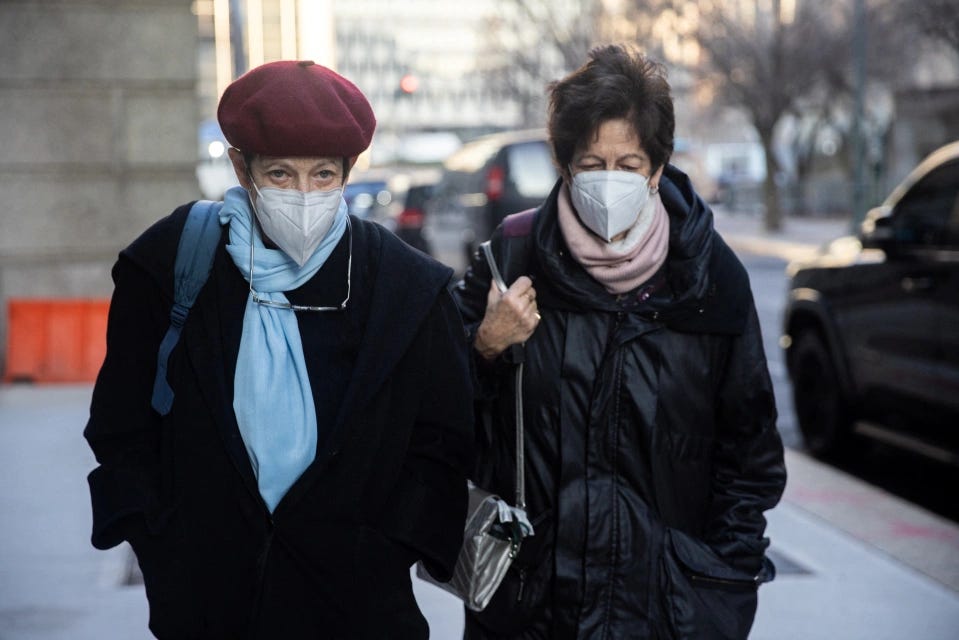
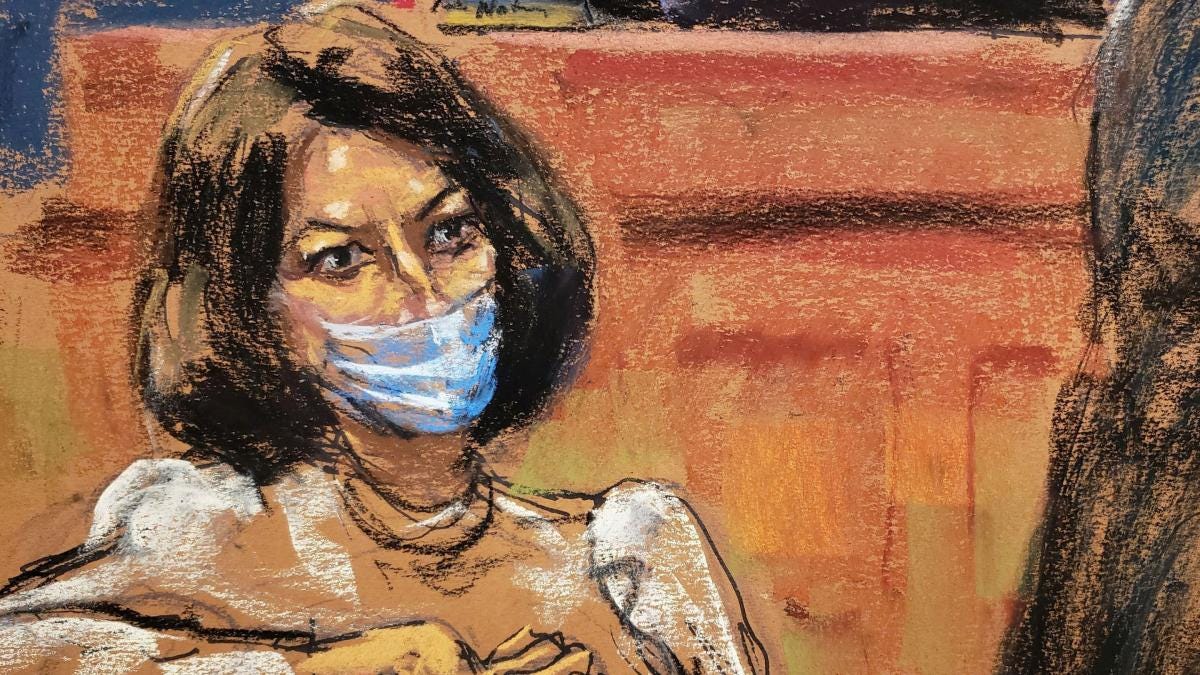
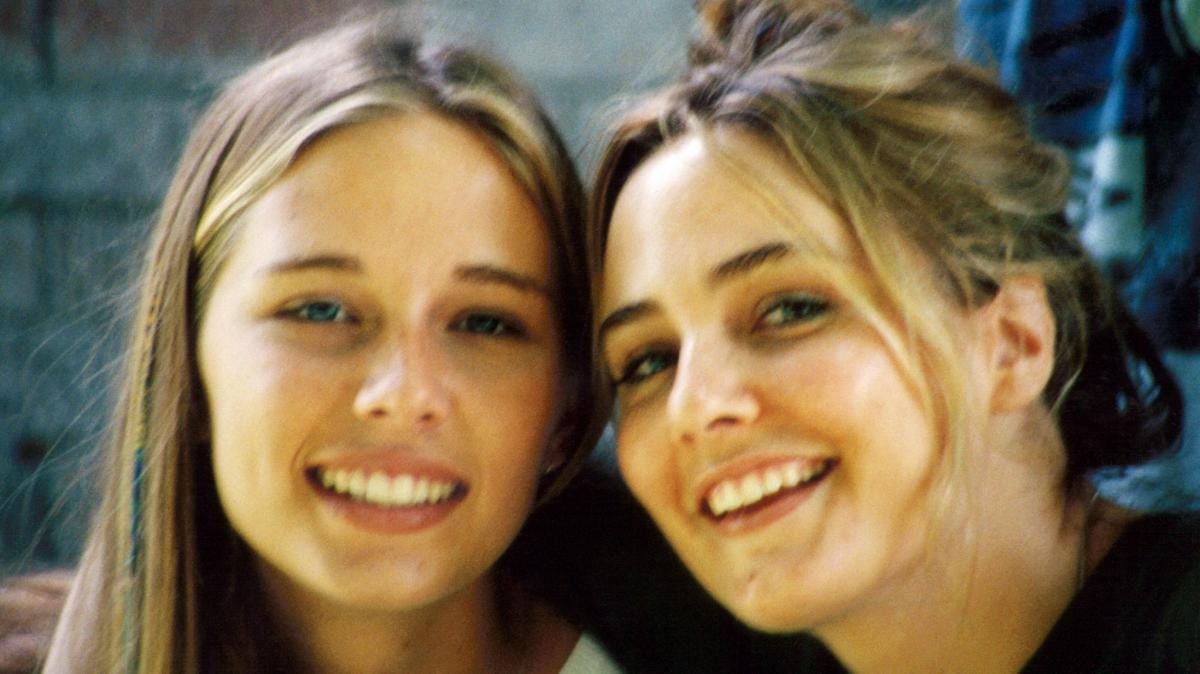





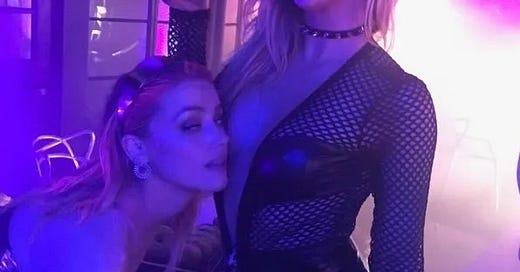

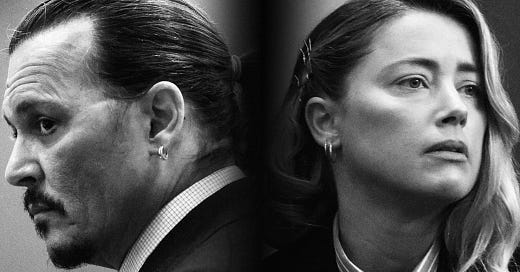



It is interesting, even to those of us who don’t trust the media and question everything, that on some level, the narrative still seeps in. Over 15 years ago everyone hated Amanda Knox, painted as the manipulative, heartless murderer from day 1 and anyone who dared defend any aspect of her being was met with a scoff. When she was exonerated for her wrongful conviction, that news was not blasted out to reach the ears of those who condemned her. I think we all needed the reminder to shutter the mainstream noise. And while Ghislaine isn’t Amanda, she is taking the blow while other are being protected, and having a family that loves you and doesn’t abandon you despite your sins or while the whole world is against you, is something we all would covet if we found ourselves in a similar situation of being Amanda or Ghislaine.
Thanks for the raw insight and the holiday sacrifices to observe from a less biased perspective, or at least being honest about your bias and checking it!
Your writing is stellar, Jess, your love of pop minutiae - your acute astute eye.. Your style is a break out vibrant phoenix-from-the-asses of VANITY FAIR, W, PAGE SIX (I love) of lore. Keep on spewing it, please & thank you.